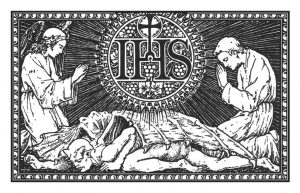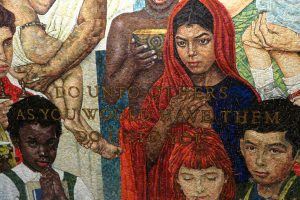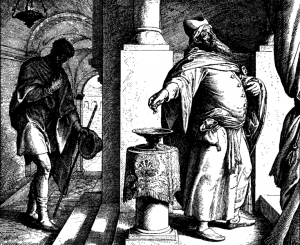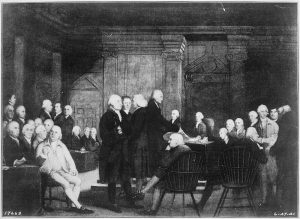====================
A homily offered by Mr. Donald Romanik, President of the Episcopal Church Foundation, on the Second Sunday in Lent, March 12, 2017, to the people of St. Paul’s Episcopal Church, Medina, Ohio. Mr. Romnanik led a Vestry Retreat for the Parish the previous two days and graciously agreed to preach the sermon for our congregation on Sunday morning.
(The lessons for the day are from the Revised Common Lectionary, Year A: Genesis 12:1-4a; Psalm 121; Romans 4:1-5,13-17; and St. John 3:1-17. These lessons can be read at The Lectionary Page.)
====================
 When I was child in my tween years, I spent a lot of time at the Public Library checking out stacks of books, with that wonderful musty library smell, to read under the big oak tree in our back yard on hot summer days. As I was a U.S. history buff both then and now, I gravitated toward a series of children’s books whose titles began with the phrase – “we were there”. For example, We Were There at Lexington and Concord, We Were There at Battle of Gettysburg and my favorite – We Were There at Pearl Harbor. The books had the same two characters – a boy and a girl around my age at the time, who happened to be living right in the middle of these key historic events. They often performed semi-heroic acts and were usually honored or congratulated by some famous person at the end of the book.
When I was child in my tween years, I spent a lot of time at the Public Library checking out stacks of books, with that wonderful musty library smell, to read under the big oak tree in our back yard on hot summer days. As I was a U.S. history buff both then and now, I gravitated toward a series of children’s books whose titles began with the phrase – “we were there”. For example, We Were There at Lexington and Concord, We Were There at Battle of Gettysburg and my favorite – We Were There at Pearl Harbor. The books had the same two characters – a boy and a girl around my age at the time, who happened to be living right in the middle of these key historic events. They often performed semi-heroic acts and were usually honored or congratulated by some famous person at the end of the book.
In addition to making these historic events come more alive, I was intrigued by the idea of actually being present during important times in human history and trying to imagine what I would see, say or do had I been there. I also engaged in this same exercise with bible stories, especially those involving Jesus. What would it be like to be living in first century Palestine and experience Jesus first hand? Which characters in the New Testament did I most identify with? And it was not just about being present during the most significant events in the life of Christ – his birth, death or resurrection. Sometimes I would just want to follow him along the way and watch him preach, teach and heal. And unlike the two protagonists in the “We were there” series, I didn’t even have to do or say anything – just be an innocent bystander or a proverbial fly on the wall.
Today’s Gospel passage would be a good time for me to be a fly on the wall in order to overhear the conversation between Jesus and Nicodemus. Like much of the Gospel of John, this passage is not about the action, it’s about the dialogue and Jesus has the principal speaking part. Furthermore, there isn’t a lot to see because it’s dark since Nicodemus comes to Jesus at night. So let’s set the scene and try to think about what we would hear and experience had we been there.
So far in John’s narrative, after being heralded by John the Baptist, Jesus does two main things – turning water into wine at the wedding feast and driving the moneychangers out of the temple in Jerusalem right before the Passover. Both of these events illustrate how God was acting out God’s purpose in the world in the person of Jesus – the wine as a symbol of God’s abundance and grace and the temple event suggesting that animal sacrifices were no longer necessary because human salvation was now assured through the cross and resurrection. It is with this background and in this context that Nicodemus comes to see Jesus.
In addition to dialogue, John is a master of dramatic setting and vivid imagery. Note that Nicodemus arrives at night with all of its connotations of darkness and secrecy. Nicodemus begins his encounter with a bold affirmation that clearly Jesus must have been sent by God as evidenced by his God-like actions and signs. In a somewhat typical John-like non-sequitur, Jesus responds with a pronouncement that no person can see or experience the kingdom unless being born from above, or, in some translations, born again. This is followed by back and forth interactions, confusion on part of Nicodemus on the difference between spirit and flesh, and Jesus’ somewhat glib comment that a Jewish leader and a learned scholar should be much more knowledgeable and astute. But Nicodemus’s apparent ignorance or naiveté provides Jesus with the perfect opportunity to proclaim the bold reality that the Son of Man has come from heaven to be lifted up as a sign that God loves the world and that whoever believes will have eternal life. Jesus invokes the image of Moses lifting up the serpent in the desert and portends his own lifting up on the cross at Calvary. We then hear one of the most famous and beloved passages in the Bible: “For God so loved the world that he gave his only Son, so that everyone who believes in him may not perish but have eternal life.”
All we know of Nicodemus in the Bible is contained in the Gospel of John. Nicodemus is described as a Pharisee, that group of Jews who were fastidious in keeping the letter of the law and often opposed Jesus throughout his ministry, especially when they felt he did not share their legalistic and ideological purity. Jesus criticized Pharisees on several occasions especially for their blatant hypocrisy. Nicodemus was also a member of the Sanhedrin in Jerusalem which was the final court of appeals for matters relating to Jewish law and tradition. It was the Sanhedrin that condemned Jesus to death but ultimately needed the approval of Pilate since the death penalty was beyond their jurisdiction under Roman law.
John reports that Nicodemus came to speak to Jesus at night. Some scholars speculate that since he was a Jewish leader and official, Nicodemus was afraid, or at least embarrassed, to be seen with Jesus in broad daylight. But given his position on the Sanhedrin, wasn’t it perfectly appropriate for Nicodemus to question Jesus in order to assess his theological credentials? No one should have been able to question Nicodemus’ authority or motivation for being there although his opening comment that Jesus must have been sent from God could have raised a few eyebrows back at the temple. Clearly, Nicodemus was as least curious about Jesus if not somewhat intrigued by and attracted to his ministry. Interestingly, after this incredible explanation by Jesus of his role as the Son of Man who came to reveal and demonstrate God’s love and the promise of new life, Nicodemus has no response. In fact, he simply disappears from the scene and presumably goes back to his former role as a member of the establishment – not yet ready to accept Jesus or to make a commitment to follow him and embrace his message of love. Perhaps after this encounter Nicodemus decided that he just wasn’t as curious or interested in Jesus as he thought he would be. As innocent bystanders and flies on the wall, all we are left with at the end of this passage is Jesus’ incredibly profound words.
Nicodemus reappears at two later points in John’s Gospel. In Chapter 7 he is sitting as a member of the Sanhedrin – that official body that condemns Jesus to die and offers a somewhat half-hearted defense that Jesus should at least have the right to defend himself and respond to the charges against him. In Chapter 20, however, Nicodemus accompanies Joseph of Arimathea, another secret follower of Jesus, and contributes an exorbitant quantity of spices for Jesus’ ritual burial. Can we assume that by the time of the crucifixion Nicodemus finally gets it and accepts Jesus as his Lord? Does Nicodemus finally have the conversion experience of being born from above and now able to experience God’s kingdom of love?
This passage from John’s Gospel is often used by fundamentalist, evangelical Christians to support their belief in the necessity of an actual and affirmative conversion experience – being born again – in order to be a true follower of Christ. But I think this approach sells these words of Jesus short and oversimplifies the concept of conversion. I’m sure there may be some people who truly have a dramatic experience of being born again into a new life in Christ. For most of us, including our friend Nicodemus, the process of discipleship moves much more slowly, and, may take an entire lifetime in order to be truly realized.
Let’s look at these famous words of Jesus once again – “God so loved the world that he gave his only son.” Jesus did not say that God was responding to the pleas of anguish from humankind or was acting from a sense of justice, power or expectation. God does not ask the world whether it wants to be loved. God just goes ahead and loves, and not only loves, but gives his only beloved Son over to death. God’s sending Jesus to our broken world was an act of unconditional love – plain and simple. God loves us whether we like it or not. In light of this love, however, we are called to accept it, embrace it and share it with others or, in the alternative, run away screaming. For it is virtually impossible to remain neutral or ambiguous in light of such Godly extravagance and abundance.
Notwithstanding a vivid imagination and my “we were there” reading memories from childhood, I was not present at Lexington and Concord, the Battle of Gettysburg or at Pearl Harbor on December 7, 1941. But, while I was not present with Nicodemus when he had his conversation with Jesus at night, attempted to defend him at his trial and helped prepare him for burial after his brutal passion and death, I feel that I and all of us have a lot in common with this famous Pharisee.
Ultimately, like Nicodemus, we have to choose to be followers of Christ fully mindful that the process is not easy, predictable, linear or quick. And that’s why we have Lent. Lent provides us with an incredible opportunity to step back, take a deep breath, appreciate God’s unconditional love and contemplate God’s ultimate act of redemption. What we learn from Nicodemus this morning is that being born from above takes time. And what we learn from Jesus’ interaction with Nicodemus is that God is infinitely patient, does not expect us to be perfect, loves us unconditionally and is waiting for us with open arms – dramatically symbolized by the open arms of Jesus on the cross. Amen.
====================
Donald Romanik is the President of the Episcopal Church Foundation.
 The First Sunday in Lent … that’s today. That means we get the story of Jesus being chased into the desert by the Holy Spirit after his baptism by John in the River Jordan, the story of Jesus being accosted in the desert by the Tempter (whom Matthew in our Gospel text today also names “the devil” – in Greek the word is diabolos meaning “accuser”), the story of Jesus refusing to give into the three temptations. We always get some version of this story on the First Sunday in Lent. And this year the Lectionary gives us a double-whammy of temptation by linking that familiar gospel tale with the equally family story of Eve and the serpent and the fruit of the tree of the knowledge of good and evil, the so-called “apple.”
The First Sunday in Lent … that’s today. That means we get the story of Jesus being chased into the desert by the Holy Spirit after his baptism by John in the River Jordan, the story of Jesus being accosted in the desert by the Tempter (whom Matthew in our Gospel text today also names “the devil” – in Greek the word is diabolos meaning “accuser”), the story of Jesus refusing to give into the three temptations. We always get some version of this story on the First Sunday in Lent. And this year the Lectionary gives us a double-whammy of temptation by linking that familiar gospel tale with the equally family story of Eve and the serpent and the fruit of the tree of the knowledge of good and evil, the so-called “apple.” When the Prayers of the People are offered later in this service you will hear a name you’ve never heard before, and you will hear that the person named was buried in our memory garden this week, and you will wonder, “Who is Indra?” (“Indra” is not the child’s real name.)
When the Prayers of the People are offered later in this service you will hear a name you’ve never heard before, and you will hear that the person named was buried in our memory garden this week, and you will wonder, “Who is Indra?” (“Indra” is not the child’s real name.) Today on the secular calendar is New Year’s Day, but that’s not true in the church. We celebrated a new church year several weeks ago on the First Sunday of Advent. In the church, January 1, being eight days after the Feast of the Incarnation, is the day on which we celebrate Jesus’ Jewishness. We call it, these days, the Feast of the Holy Name of Jesus; it was formerly called the Feast of the Circumcision of Christ because that is what Luke’s Gospel tells us was done. It was a very Jewish thing to do.
Today on the secular calendar is New Year’s Day, but that’s not true in the church. We celebrated a new church year several weeks ago on the First Sunday of Advent. In the church, January 1, being eight days after the Feast of the Incarnation, is the day on which we celebrate Jesus’ Jewishness. We call it, these days, the Feast of the Holy Name of Jesus; it was formerly called the Feast of the Circumcision of Christ because that is what Luke’s Gospel tells us was done. It was a very Jewish thing to do. I was in the pet supply aisle at Giant Eagle several days ago getting food for the Archbishop (that’s our black cocker spaniel, Lord Dudley of Ballycraic, the Archbishop Canine of Montville) when I found, right in front of the Beneful which is his favorite meal, a bin filled with these: dog toys in the likeness of a lamb dressed for Christmas. And not just any lamb! This is Lamb Chop, the somewhat snarky puppet introduced to the world by the late Shari Lewis in 1957.
I was in the pet supply aisle at Giant Eagle several days ago getting food for the Archbishop (that’s our black cocker spaniel, Lord Dudley of Ballycraic, the Archbishop Canine of Montville) when I found, right in front of the Beneful which is his favorite meal, a bin filled with these: dog toys in the likeness of a lamb dressed for Christmas. And not just any lamb! This is Lamb Chop, the somewhat snarky puppet introduced to the world by the late Shari Lewis in 1957. Which brings me to the fourth and last bit of poetry our Christmas Lamb Chop brought to mind, which is a song Lamb Chop and Shari Lewis taught their viewers during the 1992 season of the PBS show Lamb Chop’s Play-Along. Some of you may know the song and can sing along:
Which brings me to the fourth and last bit of poetry our Christmas Lamb Chop brought to mind, which is a song Lamb Chop and Shari Lewis taught their viewers during the 1992 season of the PBS show Lamb Chop’s Play-Along. Some of you may know the song and can sing along: Tuesday was the Feast of All Saints (which we are commemorating today, as is permitted by tradition, by translating the feast to the following Sunday). Traditionally, All Saints Day (or All Saints Sunday) commemorates the departed members of the Christian church who are believed to have attained heaven (it is not limited to those officially canonized by a church hierarchy).
Tuesday was the Feast of All Saints (which we are commemorating today, as is permitted by tradition, by translating the feast to the following Sunday). Traditionally, All Saints Day (or All Saints Sunday) commemorates the departed members of the Christian church who are believed to have attained heaven (it is not limited to those officially canonized by a church hierarchy).  For the past couple of weeks in the Daily Office lectionary and today in the Sunday lectionary we are reading from the Wisdom of Yeshua ben Sira, some times called Sirach, sometimes called Ecclesiasticus, one of the books of the Apocrypha, those books recognized by the Roman and Eastern Orthodox churches as canonical, but rejected by Protestants. Anglicans steer a middle course and accept them for moral teaching, but not as the basis for religious doctrine. The text is a late example of what is called “wisdom literature,” instruction in ethics and proper social behavior for young men, especially those likely to take a role in governance.
For the past couple of weeks in the Daily Office lectionary and today in the Sunday lectionary we are reading from the Wisdom of Yeshua ben Sira, some times called Sirach, sometimes called Ecclesiasticus, one of the books of the Apocrypha, those books recognized by the Roman and Eastern Orthodox churches as canonical, but rejected by Protestants. Anglicans steer a middle course and accept them for moral teaching, but not as the basis for religious doctrine. The text is a late example of what is called “wisdom literature,” instruction in ethics and proper social behavior for young men, especially those likely to take a role in governance.![Dives and Lazarus. Psalter (Munich Golden Psalter). England [Gloucester?], 1st quarter of the 13th century.](http://thefunstons.com/wp-content/uploads/2016/09/Lazarus-and-Dives-300x264.jpg) We could, I suppose, spiritualize the story of Lazarus and the rich man. We could, but if we did we would be twisting it out of shape. This is not a spiritual story. This is a bare-knuckled street-brawl of a story about wealth, about money and possessions, about someone who had plenty and about someone who had none. If we are going to honor the biblical text, we cannot spiritualize this tale; we have to deal with it as it is given us, as a story about money.
We could, I suppose, spiritualize the story of Lazarus and the rich man. We could, but if we did we would be twisting it out of shape. This is not a spiritual story. This is a bare-knuckled street-brawl of a story about wealth, about money and possessions, about someone who had plenty and about someone who had none. If we are going to honor the biblical text, we cannot spiritualize this tale; we have to deal with it as it is given us, as a story about money. I’d like you all to take your Prayer Books in hand and turn with me to page 855 which is way in the back of the book in the section called The Catechism or Outline of the Faith. At the top of the page are three questions about the mission of the church and the answers to those questions that we as Episcopalians teach. I’m going to read the questions; I’d like you to read the answers:
I’d like you all to take your Prayer Books in hand and turn with me to page 855 which is way in the back of the book in the section called The Catechism or Outline of the Faith. At the top of the page are three questions about the mission of the church and the answers to those questions that we as Episcopalians teach. I’m going to read the questions; I’d like you to read the answers: Last Monday, we celebrated our country’s 240th birthday in a way that is quite different from other celebrations of what we might call “national identity days” around the world.
Last Monday, we celebrated our country’s 240th birthday in a way that is quite different from other celebrations of what we might call “national identity days” around the world. 

